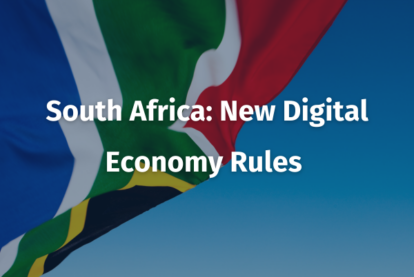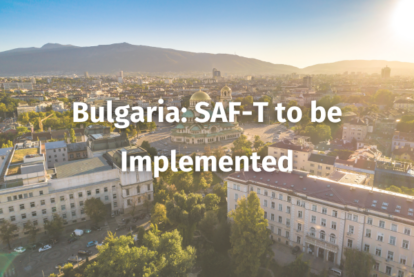International VAT Rate Round Up: April 2025
The April edition of our International VAT Rate Round Up highlights the latest updates from Burkina Faso, Croatia, Dominican Republic, Ecuador, Estonia, Indonesia, Slovakia, The Netherlands, South Africa and Vietnam.
Burkina Faso
The Finance Law for the 2025 financial year, published on 23 December 2024, introduced a number of tax changes, including amendments to VAT legislation.
Notably, foreign and local e-commerce platforms will become subject to VAT starting 1 January 2025.
- The VAT Scope for E-commerce Platforms has a dedicated clause in Article 299 of the General Tax Code of Burkina Faso. This specifies that the taxable supply scope includes:
- Sales of goods and services carried out within Burkinabe territory through foreign or local e-commerce platforms including commissions received by e-commerce platform operators in connection with these sales.
- VAT Responsibility for E-commerce Platform Operators:
- According to Article 334 of the General Tax Code, VAT due on the sale of goods and services through e-commerce platforms must be assessed, declared, and remitted by the operators of these platforms on behalf of the suppliers.
- Registration and Tax Compliance:
- Operators of e-commerce platforms are required to apply for registration with the tax authorities to fulfil their VAT obligations.
- Online Filing and Payments:
- Registration, declaration, and payment of taxes can be completed online through the tax administration’s internet portal.
- Penalties for Non-compliance:
- Failure to comply with these obligations will result in suspension of access to the e-commerce platform within the territory of Burkina Faso, in addition to the penalties outlined in the General Tax Code.
Croatia
At the end of February, a public consultation was opened regarding the extension of the 5% reduced VAT rate for natural gas and heating services until 31 March 2026.
Interested parties had until 2 March to submit comments on the proposal.
The reduced VAT rate currently applies to the supply of:
- Natural gas
- Heating from thermal stations
- Heating materials such as wood, pellets, briquettes, and wood chips.
The 5% rate was set to expire at the end of March, with the standard VAT rate of 13% scheduled to apply from 1 April.
This measure impacts both citizens and businesses and will become official after its publication in the Official Gazette – Narodne Novine.
Dominican Republic
On 3 March 2025, the Dominican Republic officially repealed Decree 30-25 through Decree 107-25, which had sought to impose an 18% ITBIS (the Dominican equivalent of VAT) on digital services provided by foreign platforms such as Netflix, Spotify, and Google Ads.
The repeal followed extensive public debate and concerns raised by businesses and consumers about the potential economic impact.
Decree 30-25, issued on 17 January 2025, was intended to regulate the taxation of digital services in the country.
However, after carefully reviewing public feedback, the government decided to withdraw the measure, citing that the country was not yet prepared for its implementation.
Foreign digital services will continue operating in the Dominican Republic without the additional VAT as originally planned.
The government remains committed to exploring alternative methods to regulate and tax the digital economy but aims to do so in a way that does not negatively affect consumers or businesses.
Ecuador
In Executive Decree No. 542, issued on 24 February, the President announced a reduction in the general VAT rate from 15% to 8% for all tourist services provided during the Carnival holiday from 1 to 4 March 2025.
The President has the authority to implement such reductions during national or local holidays, including the Saturdays and Sundays that precede or follow these holidays, but no more than 12 days per year.
So far, in 2025, nine days have been used: five during the New Year’s holidays and now four for Carnival in March.
The VAT reduction applies to the following activities, defined as tourist services:
- Accommodation
- Food and beverage services
- Transportation, when primarily dedicated to tourism (including air, sea, river, land, and vehicle rentals for this purpose)
- Operation, when travel agencies provide their own transportation
- Intermediation, including services from tourist agencies, event organizers, congresses, and conventions
- Casinos, game rooms (bingo-mechanical), racetracks, and amusement parks
Estonia
A proposal, 596 SE, for amending the VAT Law has been initiated in the Riigikogu.
The key change includes a reduction of the standard VAT rate back to 22% starting from January 2026.
Currently, the VAT rate in Estonia is 22%, but the government has adopted an increase to 24%, which will take effect starting July 2025.
Originally, the increase was intended to be temporary, lasting until the end of 2028, but it has since been decided to make this rate permanent.
Additionally, another proposal under Bill 593 SE suggests lowering the VAT rate for potatoes, fruits, and vegetables to the super-reduced rate of 5%.
Indonesia
On 27 February, the Ministry of Finance issued Regulation PKM 18, reducing the VAT rate on economy class domestic flights to 5%.
This VAT reduction applies to ticket purchases made between 1 March and 7 April 2025, for flights operating between 24 March and 7 April 2025.
Slovakia
By letter registered with the European Commission on 5 November 2024, Slovakia requested authorization to restrict the right to deduct input VAT on the purchase, lease, intracommunity acquisition, and importation of motor vehicles, as well as on the supply of relevant services, spare parts, accessories, and fuel, when these are used for both business and other purposes.
This measure applies to vehicles in the M1 category, L1e category motorcycles, and L3e category motorcycles*.
The following vehicles are excluded from this measure:
- Vehicles used for resale, hire, or lease;
- Vehicles used for the transportation of passengers for consideration, including taxi services;
- Vehicles used for providing driving lessons;
- Vehicles used for testing purposes;
- Vehicles used as replacements for those undergoing maintenance or repair.
On 13 March 2025, the European Commission issued a Proposal Decision.
Once adopted, this measure will apply from 1 July 2025 and will expire on 30 June 2028.
A request for an extension of the measure should be submitted by 30 September 2027, accompanied by a report justifying the continuation of the measures.
Note on vehicle categories:
- M1: Vehicles used for the carriage of passengers, comprising no more than eight seats in addition to the driver’s seat.
- L1e: Light two-wheel powered vehicles, characterized by:
- Two wheels, powered by propulsion as listed under Article 4(3);
- Engine capacity ≤ 50 cm³ if powered by a PI internal combustion engine;
- Maximum design speed ≤ 45 km/h;
- Maximum continuous rated power ≤ 4,000 W;
- Maximum mass: as declared by the manufacturer.
- L3e: Two-wheel motorcycles that:
- Have two wheels and are powered by propulsion as listed under Article 4(3);
- Cannot be classified as category L1e;
- Have a maximum mass as declared by the manufacturer.
The Netherlands
During the committee debate on 13 and 20 February, alternatives to abolishing the reduced VAT rate (9%) on newspapers, and sports and cultural events were discussed.
Among the considered options are:
An increase in the VAT rate on restaurant and catering services, excluding takeaway and delivery.
Standardizing the VAT rate starting from 2027 (at the earliest), which would differ from the current VAT rates.
Regardless of the choice made by Parliament, the decision should be reached by July 2025 in order for it to take effect in 2026. All proposals aim to address the budget gap, and Parliament is currently exploring various options.
South Africa
On 12 March, the National Treasury published the 2025 Budget, which includes proposals for a VAT rate increase:
- The current rate of 15% will rise to 15.5% starting on 1 May 2025.
- An additional increase of 0.5% is proposed for April 2026, bringing the VAT rate to 16%.
While these changes have been published on the South African Revenue Service (SARS) website, they are still pending promulgation by the relevant legislation.
Vietnam
In mid-March, the Prime Minister proposed an extension of the 8% VAT rate until the end of 2026, as outlined in official notification No. 22/CD-TTg.
Since 2022, Vietnam’s standard VAT rate has been 10%, with a reduced 8% rate applied to specific categories of goods and services.
The Government has been periodically extending the reduced rate.
The following goods and services are excluded from this VAT reduction:
- Telecommunications
- Information technology
- Financial activities
- Banking
- Securities
- Insurance
- Real estate trading
- Metals and products made from prefabricated metals
- Mining products (excluding coal)
- Coke
- Refined petroleum
- Chemical products
However, this time, gasoline and oil are likely to be included in the scope of the reduced VAT rate.
Stay Up to Date with Our VAT Newsletter
To ensure you remain informed about the latest VAT news, trends, and topics from around the globe, subscribe to our VAT Newsletter. Each month, we deliver insightful updates straight to your inbox, helping you stay ahead of the curve.
Partner with Real VAT Experts
With decades of experience in VAT compliance and consultancy, our team at Taxback International stands ready to assist you. We offer comprehensive expertise across all countries and languages where VAT obligations exist.
International VAT Rate Round Up: March 2025
If you missed out on our February VAT rate announcements of VAT threshold changes, you can catch up now.
Taxback International
Taxback International’s innovative tax technology and experienced tax professionals to provide VAT Compliance and VAT Reclaim services to global businesses. Find out more about our range of technologies:
Comply: End-to-end VAT Compliance Platform
VATConnect: VAT Reclaim Platform
TBI Pay: Global Payments Solution



